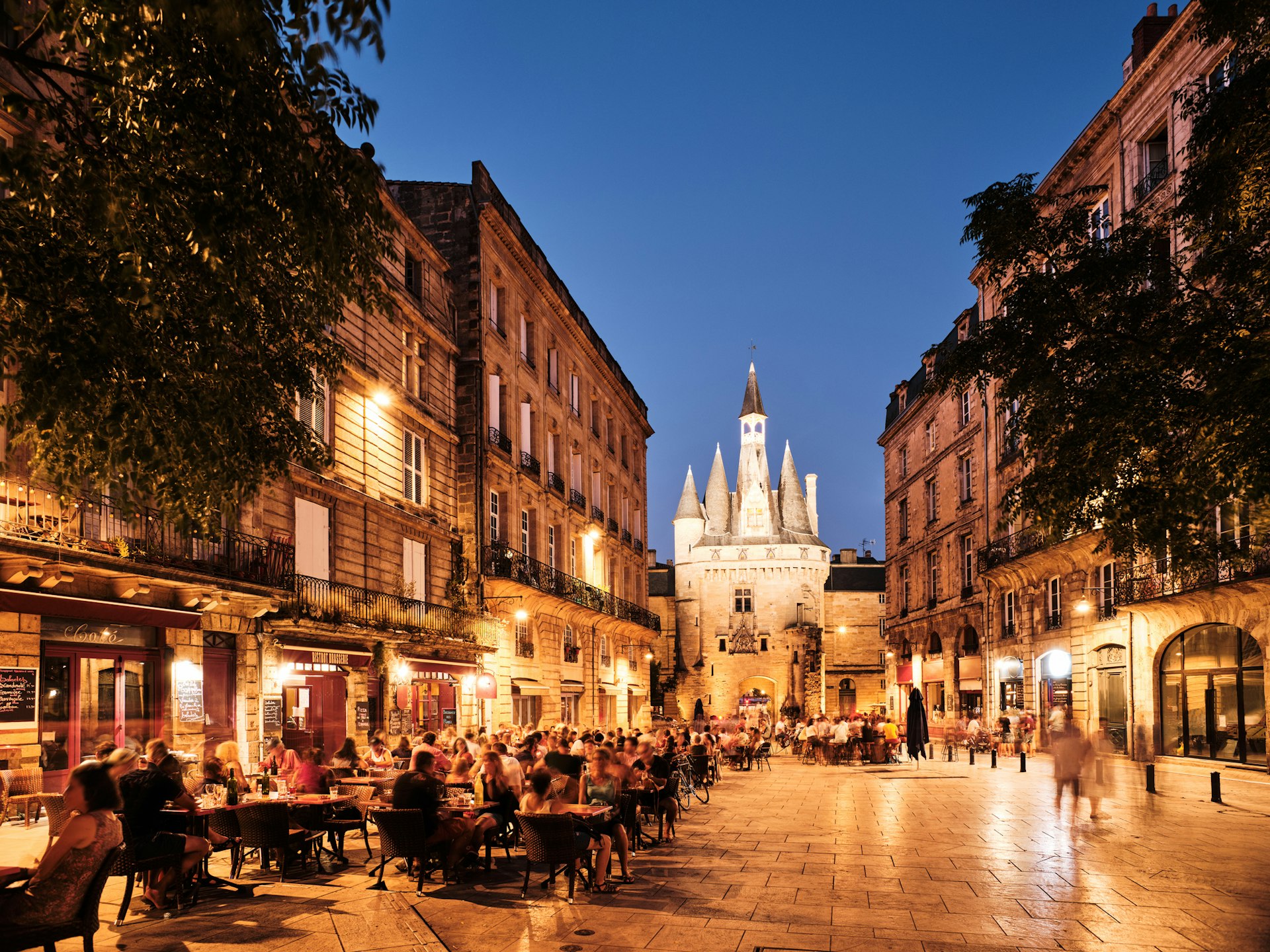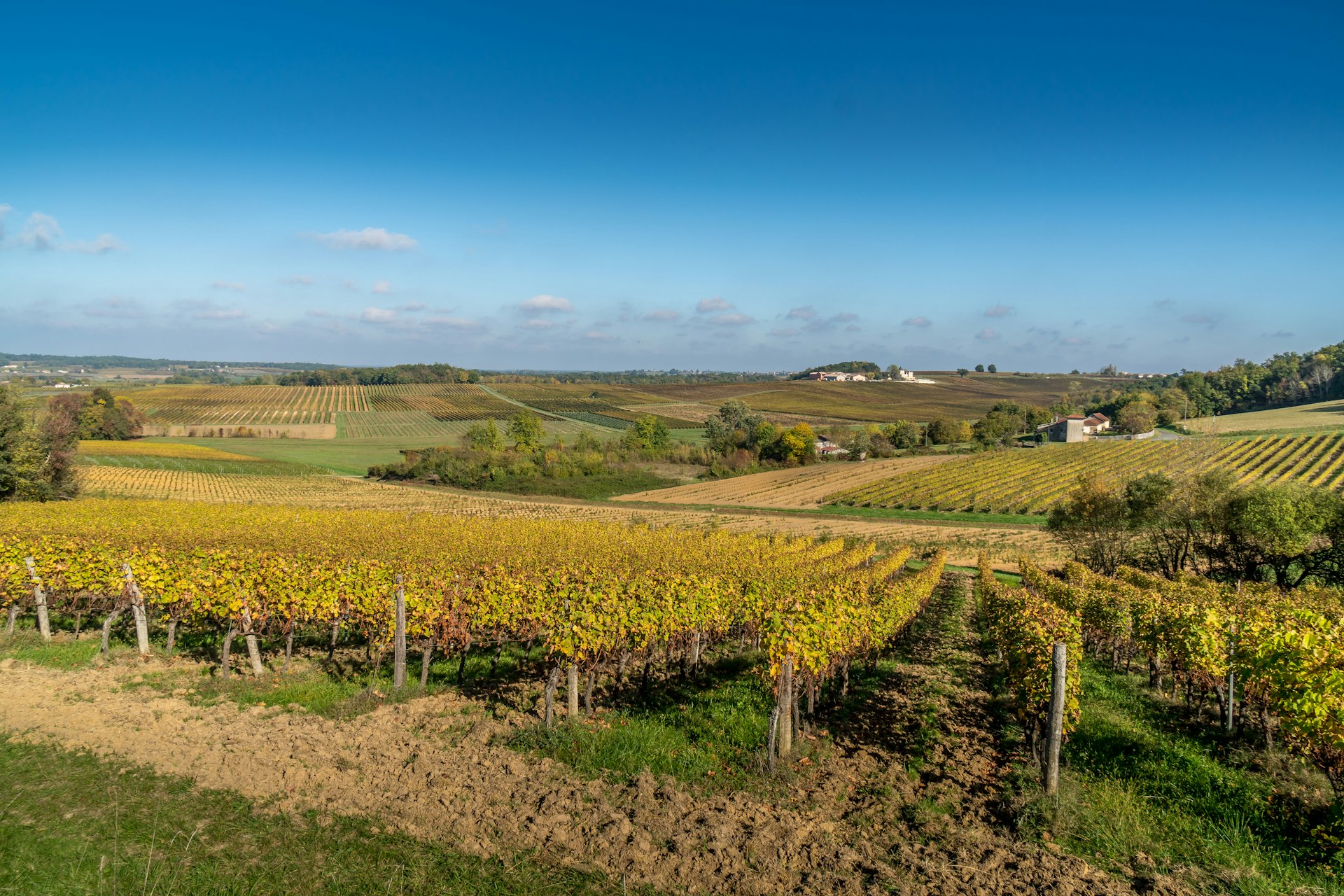The city of Bordeaux is not only about wine.
Its intoxicating blend of urban culture and epicurean sass gives it bags of appeal any time of year. Not only that: its enviable ring of world-renowned vineyards, fruit orchards and farms illuminates the urban landscape with a kaleidoscope of seasonal color, making every month visually different too.
Traditionally, summer, with its endless bluebird skies and scorching hot temperatures forcing everything – cafes, nightlife, markets, festivals – outside, is the most popular time of year to visit this city near the Atlantic Coast in southwest France. Imposing white cruise ships docked by the quays of the Garonne River in July and August feel a permanent fixture, as does the thick swarm of bikes and e-scooters streaming along the riverside’s smooth, wide promenades. The choice of river cruises, wine-tasting workshops at La Cité du Vin, and organized tours run by the Bordeaux tourist office in summer is unmatched.
Shoulder seasons – spring and fall – attract a more discerning crowd, typically in town for wine tasting, vineyard touring and offbeat sightseeing. Cheaper rates in hotels and chambres d’hôtes (B&Bs) at this time mean you get more bang for your buck. To indulge in slow, peaceful flânerie interspersed with boutique browsing and warming mugs of vin chaud (mulled wine), bag winter as your own.
March to May bursts with spring blossoms and market shopping
No season feels so perky or ripe with anticipation as the warm days of spring. Cold-weary Bordelais shed their winter coats and gloves, toot their bicycle bells, and zip around town with newfound zest. Wooden wine crates upcycled as bike baskets overflow with baby carrots, asparagus, the first sweet strawberries and pink rhubarb from Marché des Capucins or the open-air market that spills across Quai des Chartrons every Sunday morning. If hunting for antiques, vintage knick-knacks and second-hand bargains rocks your boat, time your visit with the enormous Brocante des Quinconces flea market filling Place des Quinconces for two weeks, late April to early May.
Cafe terraces in medieval Saint-Pierre burst back into life; an “after work” apéro (drink) on Place du Palais or the string of bars beading the left-bank quays is all the rage again; and people linger longer on benches in Jardin Public where magnolia and cherry trees in bloom blaze every shade of pink. Good news for walkers too: this is the best time of year to tackle a chunk of the GR Bordeaux Métropole, France’s longest urban grande randonnée (long-distance walking trail) winding 160km (99 miles) around the city and its winery- and farm-stitched ‘burbs.

June to August is a bonanza of summer parties alfresco
Rates for hotels, apartments and urban chambres d’hôtes peak in the summer months. If visiting in August, consider if you require air-con and reserve the appropriate accommodation months in advance. Some of the best bistros and restaurants staunchly popular with locals – invariably chef-owned and passionate advocates of zero-kilometer cuisine such as Soif and Mes Mots – close for much of August when many Bordelais head out of town on holiday. For brunch at Casa Gaia, a meal at farm-fueled Les Récoltants and dining at other sustainably-conscious restaurants that remain open, an advance table reservation is a good idea.
You can’t swim in the Garonne – its opaque mud-brown color is hardly enticing – but if you insist on taking the plunge, join 500 intrepid swimmers traversing the Garonne during June’s madcap Traversée de Bordeaux. Or rent a stand-up paddle board or canoe at Les Marins de la Lune in right-bank La Bastide and river-chill afloat.
Sun-sizzled July and August are prime times to frolic barefoot with urbanites, young and old, in the reflective water of the Miroir d’Eau or hit the sandy beach at Bordeaux Lac to swim, sail and kayak; the lake is 30 minutes by tram C from Esplanades des Quinconces. If you’d rather be on the water than in it, summer is the peak season for riverboat cruises – by day, dusk or over dinner. Day trips by e-bike, old-school wheels, train or car to beaches and sand south along the Atlantic coast provide a refreshing break from the sweltering city heat.
Seasonal rooftop bars and riverside guinguettes (open-air “dance halls” aka party spots) are by now in full swing. Summer festivals raise the curtain on dancing beneath the stars, music concerts on open-air stages, outdoor film screenings and other moonlit cultural soirées. Fireworks and wine tasting in buckets light up June’s four-day Fête du Vin.

September to October celebrates Bordeaux wine culture
With school kids back at their desks in September, tourist crowds thin out and peak accommodation prices plummet. Mellow days in the city are pleasantly warm and sunny – gorgeous light at sunrise and sunset – and made for walking and cycling. For wine buffs, there is no finer time to visit: foliage blushes every hue of crimson, gold and red, and sun-gorged grapes are harvested in prestigious vineyards around the city (Château Les Carmes Haut-Brion is the closest, 10 minutes by tram A from the Hôtel de Ville stop) and Médoc during September and October’s vendange (grape harvest).
Plan months ahead (gold-dust tickets go on sale in March) should you fancy scoffing wine and oysters on the run during September’s legendary Marathon des Châteaux du Médoc. Wintry, street-roasted chestnuts accompany the year’s first wine, celebrated with singing, dancing and drinking-fueled merriment in the historic wine-trading district of Chartrons at late October’s Fête du Vin Nouveau.
November to February woos culture vultures on a budget
Accommodation prices tumble, river cruise companies close for winter and museums empty: days are short, darken early and can be chilly or wet. But for culture curios eager to stroll around the world’s largest urban UNESCO World Heritage site in relative quiet, and gorge on Bordeaux’s rich museum pickings sans les crowds, this is prime time. Ditto for breakfasting on oysters and white wine at the covered market Marché des Capucins; or tucking into a steaming bowl of Bordeaux’s infamous lamproie à la bordelaise (eel stew), calf kidneys with goose-fat fries and other memorable heritage dishes from southwest France in old-world dining rooms at local institution La Tupina. Bon appétit!
